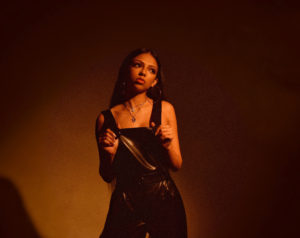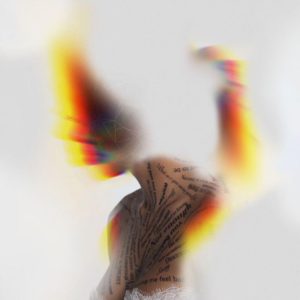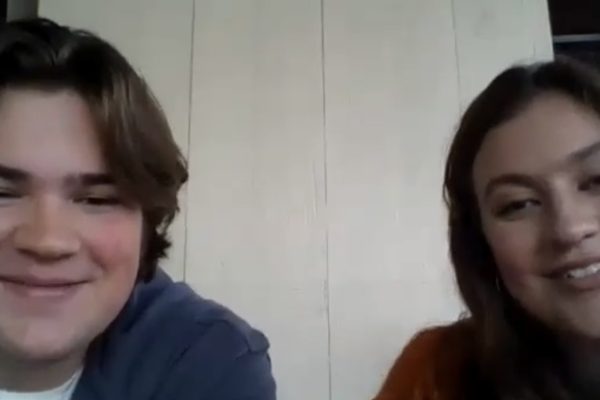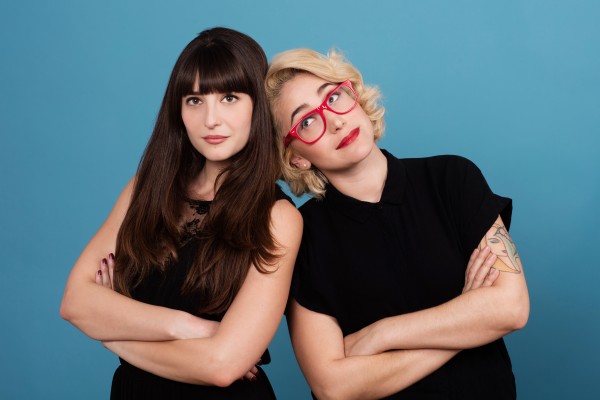There’s no such thing as a universal musical journey. If you were to ask every music artist how they got into music, they’d have a moment, an instrument, a song, etc. that made them fall in love and know that they wanted to pursue it, but how they pursue it and their chance to pursue is always different and specific to them.
24-year-old singer/songwriter Saleka began her musical journey as a pianist. She studied classical piano for years letting the craft and mastering of technique encompass her life. The goal was for her to enter a conservatory and continue studying classical piano letting that officially become her world. “Classical piano was my first musical love, and singing came as a new passion in my teenage years,” she says. While the love and power of piano stayed with her, she needed to break free of the restricting and precise nature that came with it. “Songwriting was my way of not losing either. I think the moment when I finished writing my first song, I knew that was what I wanted to do (although I was only 15 and the song was pretty bad).”
“Composing a song to completion was like a puzzle that required musical technique and discipline but was always guided by instinct and emotion over everything,” she continues. “It felt like the truest form of expression I had experienced and I just wanted to keep doing it.”
 Her musical inspiration includes the likes of Etta James and Nina Simone as well as Lauryn Hill, Billie Holiday, and Bob Marley. Their work all influential for not only their songwriting and voices but also their ability to capture emotion and experience. Making the leap to putting her own voice into the music she worked on, of course, she’d gravitate to them to help plant her feet on the ground and understand her place. “I hope to be the most me that I can be, to always write and sing music that is honest. I’ve heard people refer to a sort of dichotomy between ‘making music for your family and friends’ and ‘making music for the masses.’ But I never understood that separation,” she explains.
Her musical inspiration includes the likes of Etta James and Nina Simone as well as Lauryn Hill, Billie Holiday, and Bob Marley. Their work all influential for not only their songwriting and voices but also their ability to capture emotion and experience. Making the leap to putting her own voice into the music she worked on, of course, she’d gravitate to them to help plant her feet on the ground and understand her place. “I hope to be the most me that I can be, to always write and sing music that is honest. I’ve heard people refer to a sort of dichotomy between ‘making music for your family and friends’ and ‘making music for the masses.’ But I never understood that separation,” she explains.
[Composing a song] felt like the truest form of expression I had experienced and I just wanted to keep doing it.
Saleka continues, “When music really hits, you feel that closeness with the artist as if you are their family member or friend, you are brought into their personal experience and emotions, you feel like you know them, and more importantly like they know you. You feel connected and less alone. That’s how I feel with the artists I love like they are making music for their family and friends and we are all part of that inner circle.” Creating that sense of community in her art is a defining part of her music, she says, noting that she’ll be happy with her work knowing that’s what it brings.
Coming from a family of artists, she’s gotten to witness firsthand the impact of not only being an artist but also getting to share said art and make that a career. With M. Night Shyamalan as her dad, she got to grow up on film sets meanwhile her mom took to dance and her sister, Ishana directs all her videos. “I think one of the most important things I’ve gotten to witness is the discipline and dedication that goes on behind the scenes for every project,” she says when I ask her about growing up and seeing the behind-the-scenes of what it means to be a working artist. It’s a question that she says could make up a whole interview. Especially given that aside from growing up and watching her family work on their crafts, she ventured into music with the intention of carving herself a path away from the expectations of her family since it was a considered new territory. Saleka notes that she thinks their fears came out of love and when they saw her working on it more, they looked at ways they could be supportive in her career. Especially as she looked to make a name for herself and go out on her own.
“I think when we see a successful artist, all the years of hard work they put in are never talked about so we believe it was just luck or natural ability or it just happened in a moment. That misconception idealizes the reality, but also makes us observers feel like we are somehow different from them and that we could never do the same,” she says. “Seeing the truth behind the scenes and watching my dad work tirelessly every day regardless of any ups and downs has taught me to prioritize my own work ethic and mindset, but it has also given me a sense of agency. I know that impactful artwork doesn’t just come by luck and that if I am truly passionate, well-intentioned, and always put in the work each day I can accomplish my goals.”
While seeing her dad’s hard work making his movies taught her the importance of not giving up and the importance of her independence and free will, she credits her mom for being the one to sit her down at 4 and play piano, helping her to practice every day. “She also brought dance into all of our lives and while I didn’t grow up dancing it has become an incredibly important part of the music videos we are making and an essential tool to help express the message of these songs,” Saleka explains. It’s seen in her music video for “Clarity” which utilizes dance and body movement as she moves through the space and eventually finds herself free in the end. Her mom having a background in psychology is also impactful to not only her family dynamic but her work. “Her psychology background has also influenced the whole family greatly, every day we have conversations about social philosophy and mental health–how to understand and empathize with others and how to stay focused, positive, and remember our agency,” she continues adding that those conversations have framed her life and enabled her to continue making music.
 One of her most recent singles, ‘Graffiti’ is a shining example of how understanding and empathizing with others as well as checking in with yourself opens the door for introspection and vulnerability. She describes the song as being about the power of words and how they define our world, especially when they’re from the ones we love. The video, directed by her sister, takes a simple approach allowing her and her piano to be the center of the video, and the camera trails around her as words become tattooed on her body. Starting with “I chose you” as the first piece of ink on the side of her arm, “Calm down” seeps its way onto her wrist as more heartbreaking ones begin to stain her skin.
One of her most recent singles, ‘Graffiti’ is a shining example of how understanding and empathizing with others as well as checking in with yourself opens the door for introspection and vulnerability. She describes the song as being about the power of words and how they define our world, especially when they’re from the ones we love. The video, directed by her sister, takes a simple approach allowing her and her piano to be the center of the video, and the camera trails around her as words become tattooed on her body. Starting with “I chose you” as the first piece of ink on the side of her arm, “Calm down” seeps its way onto her wrist as more heartbreaking ones begin to stain her skin.
“All of the phrases on my body were actually things that people have said to me, from moments that I felt affected me internally and contributed to some of my self-definition. Compiling that list was a very emotional process for me, at times it brought me back to painful memories, but it was also very cathartic,” Saleka says. Ishana is responsible for the design elements such as the fonts, sizes, and boldness. “She picked ones that felt relatable to her or more significant for the message of the song to emphasize and work with the special effects make up team to map out how they should all be placed on my body,” she explains.
I know that impactful artwork doesn’t just come by luck and that if I am truly passionate, well-intentioned, and always put in the work each day I can accomplish my goals.
“Every single phrase for me has a story behind it and impacted me deeply,” she begins when I ask her about if there are any that stood out to her. However, a few that she recalls include, “You are not the boss,” “I made you,” “A waste of a night,” and “You are imagining things.” They’re phrases that hurt but they also attempt to not only demean but depower who it’s directed to. “These are some that I think are especially poignant when directed at a woman. Words are so powerful and I think there is a lot of commonly accepted language around women and people of color in our society that can enforce problematic ways of thinking and acting,” Saleka says. “I wanted to dig into that issue by examining those experiences from my own life.”
That examination influences her music similar to the ways in which the artists she looks up to let it influence theirs. Her experiences fuel her music but it has also fueled the way she’s learned to love herself and take space. It’s an important stride as she mentions that growing up as an Indian girl in a predominantly white space led to her struggling with her identity. “It’s a lifelong journey for me. I definitely rejected many aspects of myself and my culture while I was growing up, especially in middle school and high school,” she says when I ask her about how she’s starting to embrace herself more. “I think surrounding myself now with people who love and appreciate the things about me that make me different has been a huge key in learning to embrace them myself. Music has definitely been a catalyst for that as well, not only in connecting me with diverse and like-minded artists but by being an outlet for creativity where I can explore different facets of myself.”
Saleka continues, “Music has always had the power to be incredibly subversive, in contexts as large as social and political movements but also in personal contexts, where it can break down self-hate and limitations that we have set for ourselves.” It’s something that can be heard in her other songs such as “Clarity,” “Mr. Incredible” and her latest single, “The Sky Cries” for her dad’s show Servant on Apple TV+. Each song takes the hypnotic elements of jazz and mixes it with the freedom of pop and the declaration of self that defines R&B.
She talks in her interview with Vogue about how fashion is also a part of it. In her ‘Graffiti’ video she wears a stunning white dress by Caroline Duncan that embraces the simplicity of the video while also being a complete standout. She explains that it resembles a wedding dress which is fitting for the song and her singing about heartbreak. But at the same time, it shows off her use of personal expression and the power of fashion. As she sings about and lets her insecurities be painted onto her, she shares that wearing this dress had her grapple with her relationship to womanhood, to the expectations of femininity, and her body.
It’s why she knew the dress was the right look to express and elevate her song and the message. “Performing, dancing, and making music videos is what really started to change the way I think about fashion and being comfortable in my own body,” Saleka reflects. “I had to let go of some of my usual stylistic and physical insecurities in order to execute the art and overall vision. Once I experienced that, I realized that it feels so much better making choices out of strength and inspiration than making a choice because something covers or avoids an insecurity.”
Growing up wanting to “reject” things that were considered too girly or too diva, the realization and acceptance of how style was another form of expression taught her to be excited about fashion and break out of her comfort zone. “I still feel those insecurities every day but music has given me the motivation to keep fighting them,” she concludes following her goal of inspiring young women to define themselves for themselves.
It is so easy to feel imposter syndrome as an artist in our society or to think that what we are doing and what we are feeling doesn’t matter but when I recall [Audre Lorde’s] words, I am reminded that music and art are not only important but necessary.
Alongside fashion, dance, and psychology, Saleka’s music is impacted and inspired by life experiences and enhancing the experience of life. She gives a shoutout to Audre Lorde for her piece, “Poetry is Not a Luxury” as a work that has resonated with her. A manifesto that has stood the test of time, “Poetry is Not a Luxury” is Lorde’s declaration of the necessity of poetry and its power to give language to unnamed and unspoken experiences and feelings. Her point is that poetry is not a luxury because it cannot be a luxury, because it is vital to not only our hopes, fears, dreams, and experiences, but to our existence and ability to change as well.
All of which is reflected in Saleka’s music. It’s a piece that she says brought her to tears and stuck with her when she read it while finishing up most of her upcoming project. “There is so much in there that I felt explained deep existential thoughts I didn’t know how to articulate or process myself. She talks specifically about poetry, but to me, it encompasses all writing and art/creativity. How essential it is for life and freedom and hope, especially for those from marginalized communities,” Saleka praises Lorde. “The essay has definitely grown with me and helped me grow. I’ve read it over many times since then and it always resonates just as deeply.”
“It is so easy to feel imposter syndrome as an artist in our society or to think that what we are doing and what we are feeling doesn’t matter but when I recall her words, I am reminded that music and art are not only important but necessary,” Saleka concludes closing out with the realization (and potential hint?) that she might need to get herself a “Poetry is Not a Luxury” tattoo.
Stay tuned for Part II of our interview with Saleka where she discusses more of her craft and what’s next coming soon!
~~~
Saleka’s Mini-Playlist for Readers:
~~~
You can stay up to date on all things Saleka by following her Twitter, Instagram, and Facebook accounts.
Graffiti is available wherever you stream music. “The Sky Cries” from Season 2 of Apple TV+’s SERVANT is available wherever you stream music.
(photo cred: Shervin Lainez)




